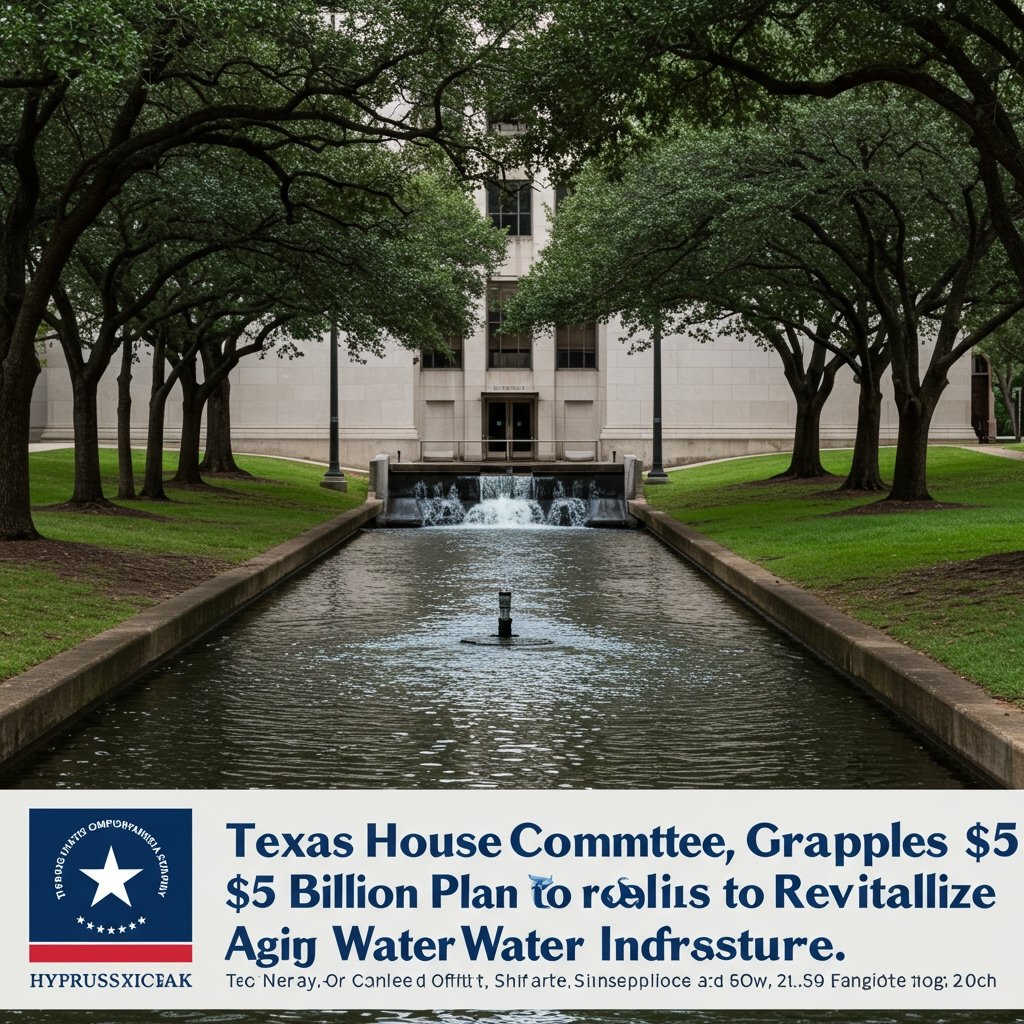Texas Lawmakers Debate Landmark Water Infrastructure Bill
A pivotal discussion concerning the future of Texas’s vital water resources is currently underway within the Texas House of Representatives. This week, a key House committee commenced in-depth hearings on House Bill 25 (HB 25), proposed legislation specifically designed to tackle the critical challenges posed by the state’s aging and often inadequate water infrastructure.
The bill, championed by its sponsor, Representative Maria Rodriguez, represents a significant legislative effort aimed at addressing potential water shortages and infrastructure failures exacerbated by Texas’s rapid population growth and increasingly frequent drought conditions. At the heart of HB 25 is a proposal to establish a dedicated state fund specifically earmarked for water infrastructure projects across the vast state.
Proposed Funding Mechanism and Scope
The financial ambition of House Bill 25 is substantial. The legislation proposes capitalizing the newly created dedicated fund with a potential total of $5 billion over the next decade. This significant investment is intended to provide the necessary resources for a wide range of projects, from upgrading decades-old pipes and treatment plants to constructing entirely new infrastructure required to serve burgeoning communities and improve water reliability in drought-prone areas.
The proposed mechanism for achieving this $5 billion capitalization involves a combination of funding sources. The bill outlines potential reliance on state bonds, a common method for financing large public works projects, which would allow the state to borrow funds upfront and repay them over time. Additionally, HB 25 is structured to strategically leverage available federal matching grants, aiming to maximize the state’s investment by securing federal dollars that complement state-level funding.
The scope of projects eligible for funding under HB 25 is broad, encompassing statewide initiatives focused on financing both essential upgrades to existing water systems and the construction of new infrastructure deemed necessary for meeting future demand and ensuring water security for all Texans.
Arguments for Urgent Investment
Supporters of House Bill 25 emphasize the urgent and growing need for substantial investment in water infrastructure. Organizations such as the Texas Municipal Water Association have testified in favor of the bill, highlighting the critical state of much of Texas’s water delivery and treatment systems. They argue that years of underinvestment have left infrastructure vulnerable to breaks, leaks, and inefficiencies, particularly as the state experiences prolonged periods of drought.
Proponents point to the undeniable realities of Texas’s demographic shifts. With the state’s population projected to continue its rapid increase in the coming years, the demand on existing water supplies and infrastructure will only intensify. Without proactive investment, supporters warn, communities face potential water restrictions, service interruptions, and economic disruption. The proposed $5 billion fund is seen as a necessary, forward-thinking step to secure reliable water access for future generations and support continued economic prosperity.
The drought concerns are particularly salient. As climate patterns shift, ensuring that infrastructure can efficiently capture, store, and deliver water during dry periods becomes paramount. Upgrades financed by the fund could include projects like improving reservoir connectivity, enhancing water conservation technologies, and developing alternative water sources, all crucial measures in building resilience against drought.
Concerns and Criticisms
Despite the broad agreement on the importance of water infrastructure, House Bill 25 has faced scrutiny and opposition regarding its specific provisions, particularly the proposed funding mechanism. Opponents of the bill have raised concerns about the potential impact of the $5 billion proposal on the state budget. Utilizing state bonds, while common, incurs debt that must be repaid with interest, potentially impacting the state’s fiscal flexibility and priorities in the coming years.
Another significant area of concern revolves around the potential effect on local utility rates. While the state fund is intended to provide financial assistance, opponents worry about how the costs associated with projects funded or partially funded by the state will ultimately be passed down to ratepayers at the local level. Questions have been raised about equity and affordability, particularly for residents in areas with limited financial resources.
Critics are carefully examining the details of how the fund would be administered, how projects would be prioritized, and the criteria for receiving state assistance, ensuring transparency and accountability for such a significant public investment. These concerns underscore the complex balance lawmakers must strike between addressing critical infrastructure needs and managing the state’s financial resources responsibly.
The Legislative Process Unfolds
The committee hearings this week marked the beginning of a crucial phase for House Bill 25. Lawmakers on the key Texas House committee are actively engaged in evaluating the bill’s specifics, listening to expert testimony, and considering potential amendments. The process involves detailed examination of the bill’s language, financial projections, and anticipated impacts on various stakeholders.
Testimony from a diverse range of individuals and groups – including state agencies, municipal water providers, environmental advocates, business representatives, and concerned citizens – is vital to informing the committee’s decision-making. This week saw initial presentations and discussions, and testimony is expected to continue into next week, allowing more voices to be heard and concerns to be thoroughly aired.
The committee’s work is a critical step in the legislative journey of HB 25. Their recommendations, potential amendments, and ultimate vote on the bill will significantly influence whether this ambitious proposal moves forward in the Texas Legislature. The debate reflects the high stakes involved in securing Texas’s water future and the complexities of funding essential public works on a massive scale.






